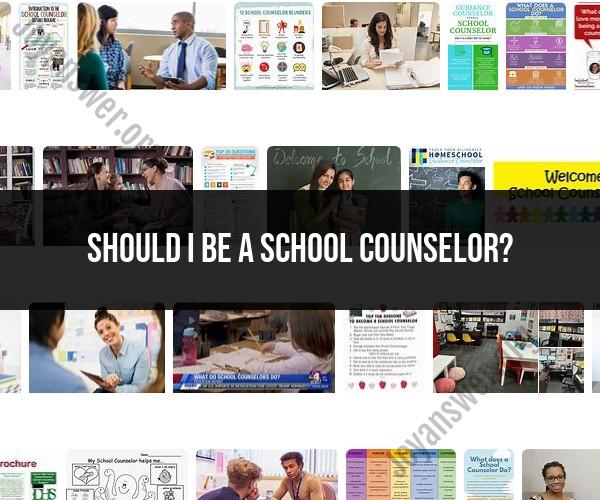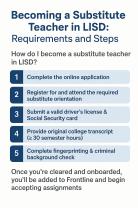Should I be a school counselor?
Deciding whether or not to pursue a career as a school counselor is a significant choice that depends on your individual interests, values, and strengths. Here are some questions to help you assess whether school counseling is the right career for you:
Do You Enjoy Working with Students?
- School counselors primarily work with students of all ages. If you have a genuine interest in helping young people navigate academic, personal, and social challenges, this career may be a good fit.
Are You a Good Listener and Communicator?
- Effective communication and active listening skills are crucial for school counselors. You'll need to empathetically listen to students' concerns and provide guidance and support.
Do You Have Empathy and Patience?
- Empathy and patience are essential qualities for a school counselor. You'll encounter students dealing with various issues, and being understanding and patient can make a significant difference.
Can You Handle Emotional Situations?
- School counselors often deal with students who are facing emotional or crisis situations. Are you equipped to handle these situations calmly and professionally?
Are You Skilled in Problem Solving?
- School counselors help students find solutions to academic and personal challenges. Strong problem-solving skills are valuable in this role.
Do You Value Education?
- School counselors work within an educational context. If you have a passion for education and believe in its importance, this career might align well with your values.
Are You Willing to Pursue Appropriate Education and Licensing?
- Most school counseling positions require at least a master's degree in school counseling or a related field. Additionally, you may need to obtain state licensure or certification.
Can You Maintain Confidentiality and Ethical Standards?
- School counselors must adhere to strict ethical guidelines and maintain confidentiality when working with students. Are you committed to upholding these standards?
Are You Comfortable with Diversity and Inclusion?
- School counselors work with students from diverse backgrounds. Being culturally sensitive and inclusive is important in this role.
Do You Enjoy Helping Others Achieve Their Goals?
- One of the rewarding aspects of school counseling is helping students succeed academically and personally. If you find fulfillment in assisting others in reaching their potential, this career may be a good fit.
Are You Interested in Continuous Learning and Professional Development?
- The field of school counseling is dynamic, and ongoing professional development is essential. Are you willing to invest in your own learning and growth?
Have You Explored the Role Through Internships or Volunteer Work?
- Consider gaining firsthand experience through internships, volunteering, or shadowing a school counselor to better understand the day-to-day responsibilities and challenges of the profession.
Do You Align with the School's Mission and Values?
- Research the specific schools or educational institutions where you might work and assess whether their mission and values align with your own.
Ultimately, the decision to become a school counselor should reflect your personal interests, values, and career goals. If you feel a strong calling to help students succeed academically and emotionally and possess the necessary qualities and qualifications, school counseling can be a rewarding and impactful career.
School counseling is a rewarding career that can make a positive impact on the lives of students. However, it is important to consider whether school counseling is the right career for you before pursuing a degree in the field.
Is School Counseling the Right Career for You?
Here are some questions to ask yourself:
- Do you enjoy working with children and adolescents?
- Are you patient and understanding?
- Are you able to build relationships with students?
- Are you good at listening and problem-solving?
- Are you organized and efficient?
- Are you able to work independently and as part of a team?
- Are you comfortable working with a variety of cultures and socioeconomic backgrounds?
- Are you able to handle stress and pressure?
If you answered yes to most of these questions, then school counseling may be the right career for you.
Weighing the Pros and Cons: Should You Pursue a School Counseling Career?
Pros:
- Rewarding work: School counselors have the opportunity to make a real difference in the lives of their students. They help students to succeed academically, socially, and emotionally.
- Job security: School counselors are in high demand, and the job outlook for the field is projected to grow faster than average over the next decade.
- Work-life balance: School counselors typically work regular hours during the school year, and they have summers and school holidays off.
- Competitive salary: School counselors earn a competitive salary, and they have the opportunity to advance their careers into administrative positions.
Cons:
- Challenging work: School counselors often have to deal with difficult students and families. They may also have to work long hours during the school year.
- Paperwork: School counselors have to complete a lot of paperwork, such as lesson plans, progress reports, and IEPs.
- Stressful environment: School counselors can often feel stressed and overwhelmed, especially when they are dealing with multiple students and families at the same time.
Self-Assessment: Determining Suitability for School Counseling
If you are considering a career in school counseling, it is important to do a self-assessment to determine whether you are suited for the field. Here are some questions to ask yourself:
- Do I have the patience and understanding to work with students who are struggling academically, socially, or emotionally?
- Am I able to build relationships with students and their families?
- Am I a good listener and problem-solver?
- Am I organized and efficient?
- Am I able to work independently and as part of a team?
- Am I comfortable working with a variety of cultures and socioeconomic backgrounds?
- Am I able to handle stress and pressure?
If you answered yes to most of these questions, then you may be well-suited for a career in school counseling.
Ultimately, the decision of whether or not to pursue a career in school counseling is up to you. If you are passionate about working with students and helping them to succeed, then school counseling may be the right career for you.












